In short, the water supply for a concrete mixer is dictated by the specific concrete mix ratio required for a project. An operator sets a timer on the equipment which corresponds to the precise volume of water needed to achieve that engineered ratio of water, cement, and aggregates.
The amount of water added to a concrete mix is not an estimation; it is a critical calculation. This single variable, known as the water-cement ratio, is the primary determinant of the final concrete's strength, durability, and workability.

The Principle: The Concrete Mix Ratio
The foundation for determining water supply is the "mix design" or "mix ratio." This is the recipe for the concrete, engineered to meet specific performance requirements for a construction project.
What is a Mix Ratio?
A mix ratio specifies the exact proportions of the core components of concrete: cement, fine aggregates (like sand), coarse aggregates (like gravel), and water. It ensures every batch is consistent and meets quality standards.
The Critical Water-Cement Ratio
The most influential factor within this recipe is the water-cement (w/c) ratio. This is calculated by dividing the weight of the water by the weight of the cement in the mix. This ratio directly governs the final properties of the hardened concrete.
Impact on Strength and Workability
A lower water-cement ratio leads to higher strength and greater durability but makes the concrete stiffer and harder to work with. Conversely, a higher water-cement ratio produces a more fluid, workable concrete that is easier to pour, but results in lower strength.
How Modern Mixers Control Water Supply
Modern concrete mixers use straightforward and reliable systems to ensure the correct amount of water is added based on the mix design.
The Time-Based System
The most common method involves a water pump linked to a timer. The system is calibrated so the operator knows exactly how much water is dispensed per second or minute.
Adjusting for the Batch
Based on the batch size and the required water-cement ratio, the operator calculates the total volume of water needed. They then set the timer to run the pump for the precise duration required to deliver that exact volume.
Understanding the Trade-offs
Controlling the water content is a balancing act between achieving the desired strength and ensuring the concrete is practical to use on site. Getting it wrong has significant consequences.
The Risk of Adding Too Much Water
Adding extra water on-site to make concrete easier to pour is a common but dangerous mistake. This un-calculated water drastically increases the water-cement ratio, which significantly reduces the final strength and durability of the structure.
The Challenge of Too Little Water
Conversely, insufficient water results in a mix that is too stiff. This "dry" concrete is difficult to place and compact properly, which can lead to voids, known as honeycombing, creating weak points in the structure.
The Goal of Homogeneity
Even with the correct amount of water, it's useless if not mixed properly. The mixer must run long enough to achieve homogeneity, ensuring the water and all other components are evenly distributed throughout the batch for uniform quality.
Making the Right Choice for Your Mix
The ideal water content is always determined by the project's engineering specifications, not by convenience.
- If your primary focus is maximum strength and durability: You must adhere strictly to a lower, specified water-cement ratio.
- If your primary focus is workability for complex forms: The mix design may specify a slightly higher water-cement ratio or the use of chemical admixtures (plasticizers) to increase fluidity without compromising strength.
Ultimately, precise water control is the cornerstone of producing reliable, high-quality concrete.
Summary Table:
| Factor | Impact on Concrete |
|---|---|
| Water-Cement Ratio | Primary control for strength & workability |
| Mix Ratio (Design) | Engineered recipe for project specifications |
| Timer-Based System | Ensures precise water volume delivery |
| Mixing Time | Critical for achieving homogeneity and uniform quality |
Need a reliable concrete mixer that guarantees precise water control and batch consistency?
At GARLWAY, we specialize in high-performance construction machinery, including durable concrete mixers, winches, and batching plants designed for contractors and construction companies worldwide. Our equipment ensures you achieve the exact water-cement ratio required for strong, durable concrete on every project.
Contact our experts today to find the perfect mixing solution for your specific needs and build with confidence!
Visual Guide

Related Products
- Ready Mixer Machine for Construction Ready Mix Machinery
- Commercial Construction Mixer Machine for Soil Cement Mixing Concrete
- Auto Concrete Cement Mixer Machine New
- JDC350 Small Cement Concrete Mortar Mixer
- HZS90 Large Multiquip Concrete Mixers for Construction
People Also Ask
- What maintenance is required after a new concrete mixer has been used for one day? The Essential First-Day Break-In Guide
- How do pan mixers discharge concrete? Unlocking Efficient, High-Volume Concrete Production
- How does one choose between a batch mixer and a continuous mixer? Optimize Your Concrete Production
- How does a planetary mixer operate? Achieve Superior, High-Shear Mixing
- What post-operation procedures should be followed for a self-loading concrete mixer? Ensure Longevity & Prevent Downtime
- What are the features of continuous drum mixers? Achieve Maximum Output for Large-Scale Projects
- Which type of projects require a mortar mixer? Essential for Masonry & Finishing Work
- How does a Continuous Mixer operate? Achieve Unmatched Speed and Consistency for High-Volume Projects















